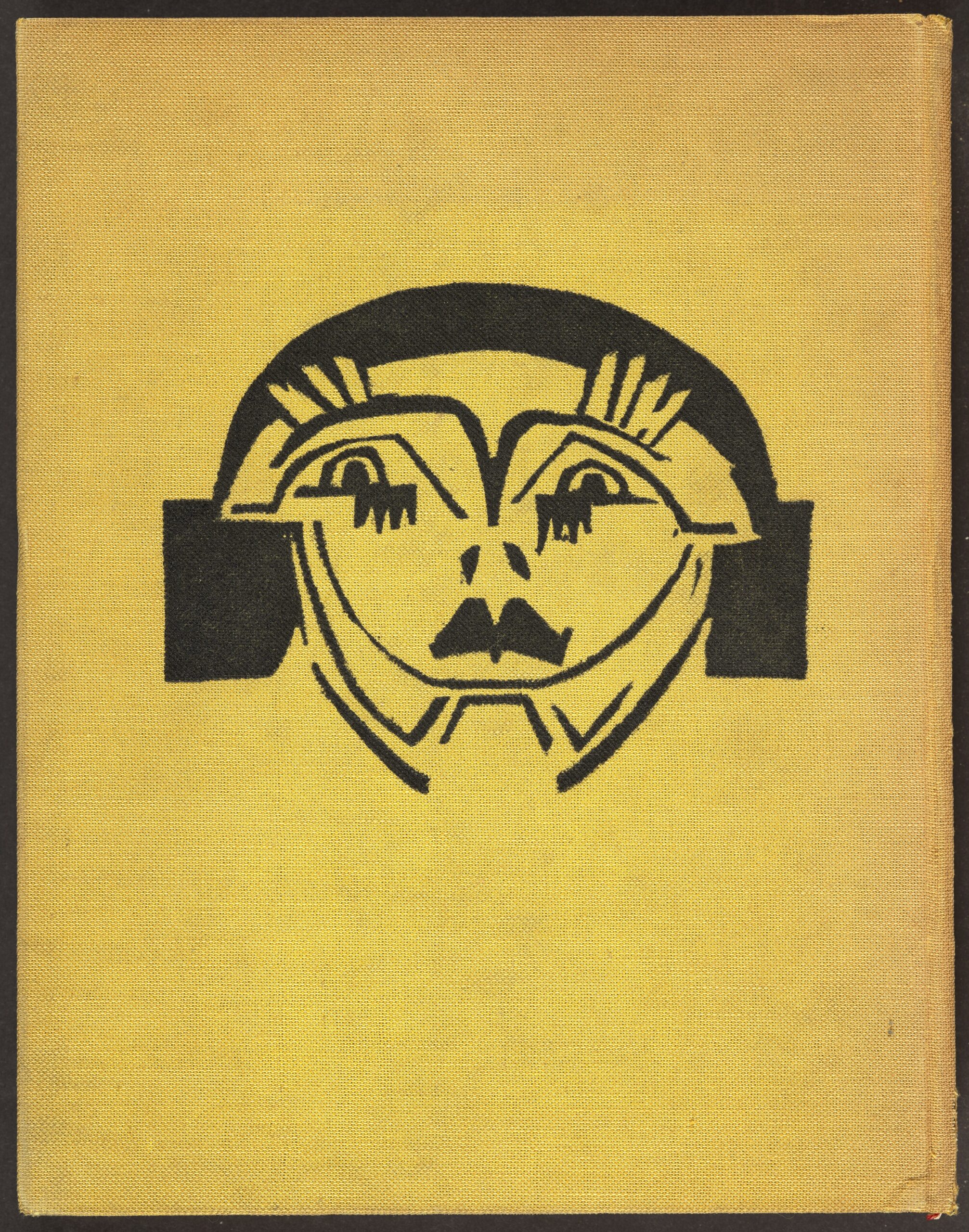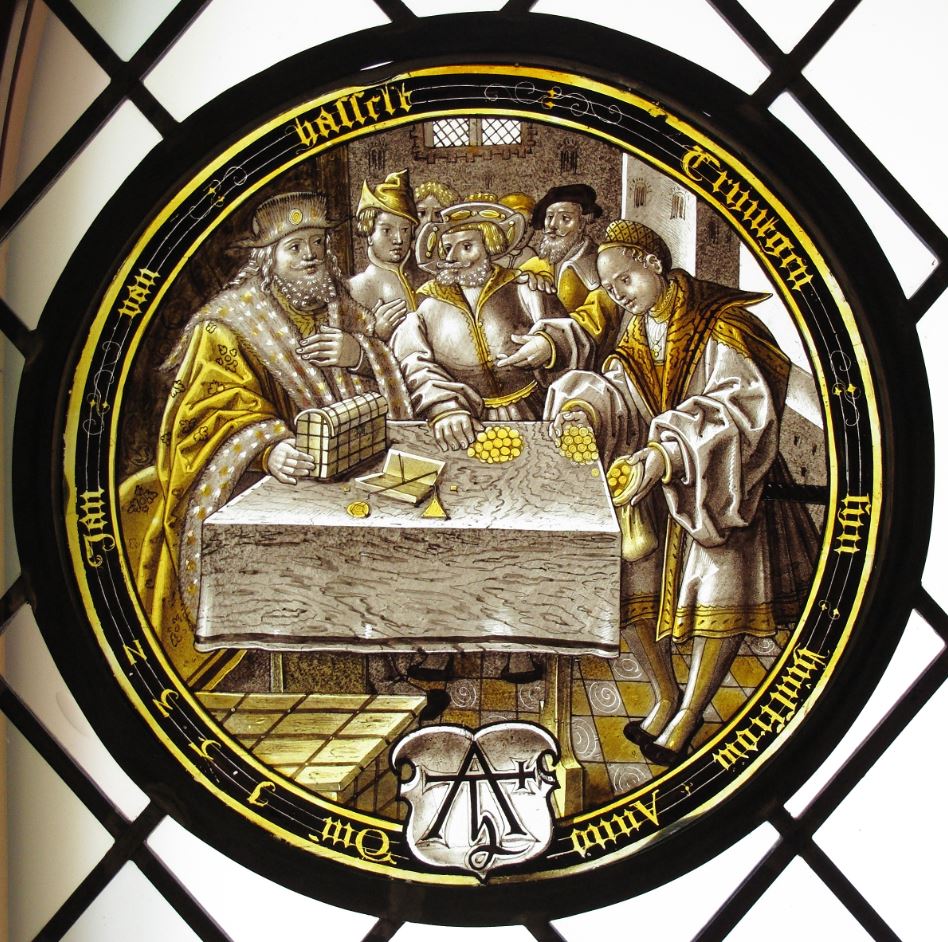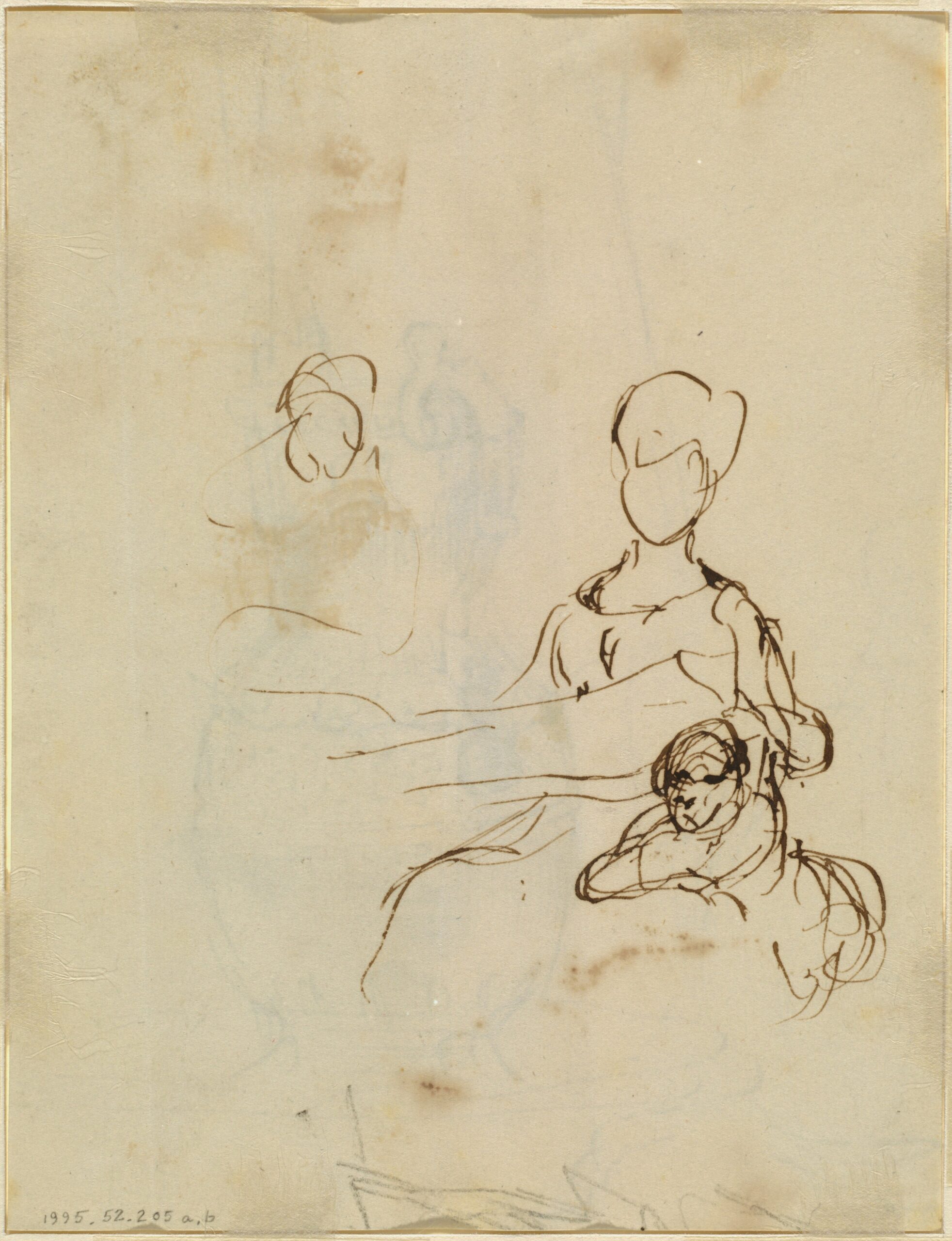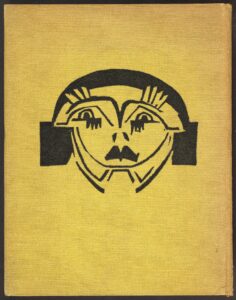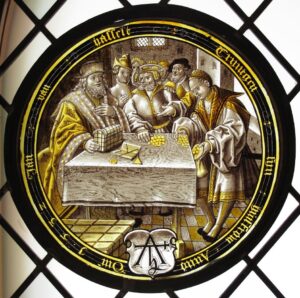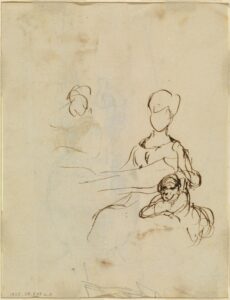Tell Them You Love Them in Person
Zachary Kocanda
The day before Valentine’s Day, the sign above the expressway read: Texting is tacky. Tell them you love them in person. The Illinois Department of Transportation was more romantic than me. I liked to hide behind my phone and send messages on dating apps, bad flirting, generally unreciprocated. I debated taking a picture of the sign and tweeting it, but I didn’t want to die for five likes. I only had fifty followers, no real friends, just people from high school and a few randos. The heat in my car was broken, and I didn’t have gloves. My hands were numb. Taking a picture would be even more dangerous than texting and driving, a favorite hobby of mine.
The date was at a mall because I had no better ideas. The mall was halfway between where Sophia and I lived. I figured this out with a website that analyzed two addresses and calculated points of interest halfway between them, mostly bars and restaurants, plus—for people who were bad at planning dates—malls. Woodfield Mall was, to its credit, the largest mall in the state, but I hadn’t been there before, even though it was half an hour from my apartment. In fact, Woodfield was the largest mall in the country when it opened in the early ’70s, but today, it didn’t even crack the top ten. There was a Macy’s, a Nordstrom, the world’s largest Sears (still, to this day, I confirmed), plus over three hundred other stores—even a Rainforest Café—but there had been no reason for me to go there until this date.
Oh, that’s the day before Valentine’s Day, I texted her after we had figured out the details. Sophia said a date was a date.
My other suitors had even worse ideas, she replied.
I had a graphic design job with a company owned by my uncle on my mother’s side, who had given me the job because my mother asked him to, and Sophia was taking classes at a community college and living with her parents, but she planned to transfer to a four-year university downstate next year. I had even read her admissions essay about visiting her family in Poland.
There were a few typos, but overall, a fine job, I summarized in a text.
Fine doesn’t get scholarships, she replied, then she asked if I could please, please read it again.
I parked in the nearly empty Macy’s parking lot then walked through the maze of the store to get to the mall. I was about fifteen minutes early, because I was always early, so I looked at hats and gloves on sale while I slowly made my way through the aisles.
I sat on a bench outside the Rainforest Café and debated buying a coffee, but then I would have to drink it quickly before Sophia showed up so we could buy coffee together, because I had no idea what else we would do during a date at the mall.
We could go to Yankee Candle and smell all the candles until our heads hurt, she suggested yesterday. There was an insane buy-one-get-three-free deal the last time I was there.
I replied, This is why malls are dying. The deals are just too good.
We had planned to meet at seven o’clock, but at fifteen after, I hadn’t heard from her, so I walked over to the coffee shop to buy a small coffee, then drank it in five minutes. I had double-texted Sophia, first just before seven when I parked, then fifteen minutes later about where I was sitting. A triple text would be a faux pas too far. I had yet to hear back. It was close to 7:30.
Then she walked up to me as I waited on the bench, coffee settling poorly in my gurgling stomach. “I could barely recognize you from your pictures,” she said.
“I’m sorry to disappoint you,” I said.
“No, you look better in real life.”
“I’m sorry I don’t have more recent ones, but I don’t have friends who take pictures of me, and I didn’t want to use a selfie.”
“I hate it when old people take selfies, so that was the right move,” she said. “I’m sorry I’m late. Drove the wrong way down three one-way streets. I didn’t have my glasses with me. I’m a terrible driver, but I don’t text and drive.”
I said I didn’t either.
The two of us walked over to the coffee kiosk, my second time there in half an hour. I prayed the barista wouldn’t say anything about it—I would leave a second tip if he played it cool.
“Are you going to pay for my drink?” Sophia asked.
“Probably,” I said, and then, confidently, I said, “Yes, I am.”
“I figured you were going to do that thing where you order first, then say, ‘Oh, I’ll get yours too,’ like it’s a spontaneous decision, then there’s a back-and-forth where I politely decline at least twice before saying you can buy mine, but I have a very specific order, so we can’t play games,” she said, locking eyes with me. Sophia’s hair was white-blonde, but she had a pair of incredibly expressive darker-colored eyebrows. “Can you please ask the barista to make me a hot chocolate at kids’ temperature? Their drinks are too hot for me,” she said. “That’s the only solution. And you can’t forget this. I’ll have to wait literally hours to let it cool if it’s made at adult temperature.”
“OK, but first of all, that’s not ‘adult’ temperature. That’s regular temperature,” I said. “That’s simply how they make hot beverages.”
“Boooo,” she said. “When your taste buds don’t work when you’re even older, text me so I can tease you about it. You’re just upset because you don’t want people to think I’m your sugar baby.”
“If I had sugar daddy money, I wouldn’t be buying us both smalls,” I said. “I hope you’re alright with a small.” I turned to the barista and ordered one small coffee plus one small kids’ temperature hot chocolate, please make sure it’s kids’ temperature.
We waited for our drinks in silence, then walked to the food court to sit at a two-top.
We sipped our drinks, her first drink and my second.
“This is the largest mall in the state, huh? They’re proud of that. It’s all over their website,” she said.
“Go big, or go home,” I said.
“I didn’t know that was an option,” she said, standing up. She asked if I was up for some walk and talk. I nodded, took a too-large sip of hot coffee that burned my mouth. I refused to tell her about this injury.
“Tiffany played here three days in a row in the ’80s,” I said as we walked past a musical equipment store. I heard a patron poorly playing electric guitar. “My mom was here all three days, and she even skipped school for it on the third day.”
“Tiffany?” she said.
“‘I Think We’re Alone Now,’” I said.
“There are hundreds of people here. You can’t see them?” she said.
“That’s her number-one hit,” I said. “Back in the ’80s.”
“I was negative years old in the ’80s,” she said.
“I wasn’t there either,” I said.
“But you had been conceived by then, right? I’m doing the math in my head,” she said. “Isn’t she the one who was shot by one of her psycho fans?”
“No, I saw her at Ribfest in Naperville a few years ago with my mom.”
“Is that what you do for fun?” she asked.
“Not a lot of options here,” I said.
“Do you and your mom do everything together?” she asked. “Did your mom drive you here?” she asked. Then she stopped, right in the middle of the walkway. I also stopped. The person walking behind us had been texting and nearly ran into me. They called me an asshole, and I apologized to them.
“Did she drop you off?” Sophia asked. She lowered her voice to a whisper, asked, “Is your mom in this mall right now? I bet she’s sitting in Rainforest Café while you’re on your little date.”
She asked if I had ever skipped class, like my mother skipped class for the third Tiffany concert. I said I had never skipped a class in my life. I had always been a goody two-shoes, cautious to a fault. I remembered my mother said Tiffany’s third performance was her best, so she made the right decision to skip class, even if she got in trouble with her parents.
“It’s been a while since I was even taking a class I could skip,” I said, and she asked me to count the years, but I said that would take too long—I would have to do that on our second date. That was the type of joke to drop to see how your date reacted to the idea of a second date. Sophia’s eyebrows said nothing.
I said I dropped out of community college after one semester. “I’m not exactly an academic pro,” I said.
“Now why did I ask you to read my essay?” she asked. I shrugged.
I asked if she wanted me to throw out her cup, but she wasn’t done yet. I was a fast drinker, even with hot beverages made at adult temperature. I walked over to a trash can and tossed my cup into it.
I returned to the table and asked Sophia to tell me about her family. “Now that you know I hang out with my parents for fun,” I said.
Sophia said her parents were born in Poland. They moved here before she and her older brother were born, but she didn’t know much else. “I’ve seen them kiss like twice,” she said.
“You need to invite them to more concerts,” I said.
“Try this,” she said, handing me her hot chocolate. I accepted the cup, sampled a small taste. “Much better, right?” she asked.
“That’s lukewarm,” I said. “If you ask me, that’s too cold.” I handed it back.
“It’s not cold, it’s just not going to burn you!” she said. “That’s the temperature all hot beverages should be.” We agreed to disagree.
We stopped in front of a map of the mall. I started to scan the ten-column, color-coded directory for date activities. “There’s an improv comedy club here,” I said.
“I know we don’t really know each other, but are you trying to get me to end this date early?” she asked. “It’s funny there are hundreds of stores here but there’s nothing to do. I don’t know how I spent hours here when I was in high school.”
Sophia pointed to the Rainforest Café on the map, said she worked there as a hostess for one day when she was sixteen. During her first shift, the hostess training her made her cry, so she never worked there again. “The top’s cute though,” she said. “I still wear it. I never officially quit. I wonder if they still ask about me. The mysterious blonde who worked one shift and disappeared. Have you ever worked in a mall?”
I hadn’t, but I told Sophia my parents met at a mall when they both worked there in high school. She asked if they worked in this mall, and I said the mall they worked in closed years ago.
“It would be funny if you were conceived in this mall,” she said. “I bet they would have named the food court after you.”
“There would be an animatronic of me in Rainforest Café.”
“An animatronic of a sad, old man who says, ‘Don’t make the same mistakes I did, kids!’ A PSA before the animal band starts playing. I wonder what their final song’s going to be. I read it’s closing soon,” she said.
“That’s so sad,” I said.
“Is it?” she asked.
“Not really,” I said. “I don’t even like their food. I haven’t eaten at a Rainforest Café for years. I’m part of the problem.”
“You’re always part of the problem, and the first step is recognizing that,” she said. “It’s kind of sad when any restaurant closes, especially when it’s a tacky one like that. It has character.”
“What do you think they’re going to do with the robot animals?” I asked.
“We should ask the hostess,” she said. “Maybe we can buy them. I bet they’re trying to get as much money as they can before it closes.” I thought it would be funny to ask how much it would cost to buy an animatronic cheetah, but then we would have to look into the eyes of the sixteen-year-old hostess who looked like she wanted to die and just wanted to make enough money to get away from her parents for an afternoon. It was a funny idea, but that was all it would be—an idea to laugh at tonight and forget until weeks later when we would read online that the Rainforest Café in the mall had, in fact, closed.
“This is a lot cheaper than going to the zoo lights,” I said.
“I’m a cheap date,” she said. “Just take me to Rainforest Café—don’t even have to go inside. Take me right outside the entrance so I can spy on the robot animals.” A sip of hot chocolate. “And someone took me to zoo lights last month anyway.”
“They say malls are dying, but there are too many people here,” I said. “I don’t think I was that annoying when I was a teenager.” I pointed to a group of unruly teens roughhousing near a fountain. I asked if she thought malls were dying, and she said, “Like this conversation?” She added, “I’m joking. It’s going well. B+. That’s a grade, if you forgot what those were because you haven’t been in a classroom since Obama’s first term.” I made the calculation in my head.
“I made it to spring semester that year,” I said. “Oh, I dropped out after syllabus week, so that was before his second term started. You’re right. I couldn’t pay for classes, so I called it quits.”
“Obama’s America,” she said. “But that’s so sad,” she said, gesturing toward the teenagers with her cup. “You’re so old you forgot what it’s like to have fun.”
Sophia started sending a long text, so I played with my phone too.
“I’m sorry for being on my phone,” she said. “I’m waiting for a text, but I know it’s tacky to look at your phone during a date.” That was the second time she had used the word tacky, like on the sign above the expressway.
“You saw the sign too?” I asked, and when she said, “What?” I said it was nothing.
“I don’t want to get into it. It’s family stuff.” I apologized to her. I wanted to tell her about the sign above the expressway written by a lovesick IDOT employee. I wanted to ask her, Have you even been in love? but then she would ask me if I had been drinking—or that was what I would ask if I were asked that question on a first date—but then I would answer and say I had never been in love. I would have appreciated being asked. I wished I had been dating when that New York Times article about the thirty-six questions to ask a person to fall in love with them was going around, but that was a few years ago, and no one was doing that now.
“That’s the word I would use to describe that sweater,” she said, and I said, “Huh?” and she said, “You know, tacky, but I love it. It’s tacky, but it’s not trying too hard. There’s a whole market for ugly Christmas sweaters, but they’re not fun if they’re made to be ugly. That’s a thrift store find, for sure.” I was wearing a sweater I had thrifted from the Salvation Army in high school, decorated with a flock of flying ducks. I pulled at its collar, sweating despite the day’s subzero temperatures. In fact, it was a record low for the day before Valentine’s Day, as I had learned from NPR on the drive earlier. The news loved telling you when it was an all-time low temperature, like it was a fun fact and there weren’t homeless people freezing to death, not that I did anything to help them either. I didn’t even give money to people with handwritten cardboard signs at stop lights. I avoided eye contact with them at all costs.
Sophia fired off another text, huffed, and looked back up at me.
I racked my brain for conversation topics for a date. I said despite being the shortest month, February was always the worst month of the year, but she asked me for specific examples of what made February worse than other months, and I couldn’t think of any, except the St. Valentine’s Day Massacre, and that was a while ago.
“It’s all in your head,” she said. “The month’s only half over, and you’ve already had a hot date.”
“How’s your month going?” I asked.
“Free hot chocolate,” she said. “It’s in my top two months of the year so far, even if it’s nothing to write home about.” She pulled out her phone again. “…but I really do need to write home because my parents keep blowing up my phone asking where I am. I think they’re going to marry me off if I’m not engaged soon. They really want me out of the house. I think they’re waiting for me to fail out of community college first. I need you to tell me you believe in me.”
“I believe in you,” I said. “Cs get degrees.”
“I’m more reassured than I was before, but unfortunately, the reassurance was from someone who failed out of community college.”
“I didn’t fail out!” I said. “Dropping out was completely unrelated to my grades.”
“If you say so,” she said, all eyebrows, again.
Another sip of kids’ temperature hot chocolate.
“They’re all so traditional, my family. My brother’s only a few years older than me, and he has two kids. I don’t ever want to get married,” she said. “This foils your plan for a mail-order bride, huh?” she said.
Another sip.
“I can download other apps to find my mail-order bride,” I said. “If you don’t want to get married, what’s your plan? Sugar daddy?”
“Do you know one?” she asked.
“If you tweet about it, a bunch of bots swarm your DMs with sugar daddy offers. Maybe some are real. I’ll follow up with one and let you know how it goes.”
“No, I’m searching for something specific. Can you tell me if there’s a website for it?” Our eyes locked. Her eyebrows had never read as so sincere.
“Go ahead,” I nodded.
“I just want to get fucked.”
I let out a breath, fast, a laugh that turned into a cough, and then I couldn’t stop coughing. Sophia held out her cup and asked if I needed a drink, but I shook my head. I stopped coughing but reluctantly accepted the hot chocolate. Even more lukewarm now, but not bad. I told her to tell me more about her family as I recovered from my near drowning.
“Most of my family lives in Poland,” she said, then she paused. “Wait. You read my essay about this, you fucking nerd.”
I dismissed this teasing with a swat of my hand and a smile.
“I’m visiting them next month,” she said. “I go there every few years. They live on a farm that’s been in the family for generations. They’re probably going to ask me to move there, try to set me up with one of their neighbors’ kids. They hate my parents, but they love me and my brother.”
“What if you were engaged to a wealthy American?” I asked. I laid out the plan. “What’s in it for the would-be fiancé?”
“Huge dowry,” she said, raising her eyebrows. “Do you know any wealthy Americans, by the way? Can you give them my number? The suitors so far have been questionable.” Texting was her first problem, I had to tell her. How many lives would be saved by the sign above the expressway? More importantly, how many lovers? I coughed before I could tell her this advice. I wanted to ask for another sip of her drink, but it was too late. She finished her kids’ temperature hot chocolate, then set it down, empty.



